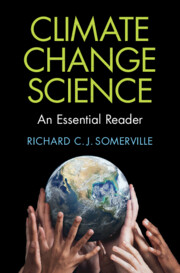Book contents
- Climate Change Science
- Reviews
- Climate Change Science
- Copyright page
- Dedication
- Epigraph
- Contents
- Preface
- Acknowledgments
- Part I Eight Articles from the Bulletin of the Atomic Scientists
- Part II Understanding and Communicating Climate Change Science
- 9 Preparation
- 10 Stories
- 11 Language
- 12 Solutions
- Part III Scientific Investigations of the Climate System
- Part IV The Future
- Appendix: Curriculum Vitae of Richard C. J. Somerville
- Glossary
- Resources: Recommended Websites and Books
- References
- Index
11 - Language
from Part II - Understanding and Communicating Climate Change Science
Published online by Cambridge University Press: 13 November 2025
- Climate Change Science
- Reviews
- Climate Change Science
- Copyright page
- Dedication
- Epigraph
- Contents
- Preface
- Acknowledgments
- Part I Eight Articles from the Bulletin of the Atomic Scientists
- Part II Understanding and Communicating Climate Change Science
- 9 Preparation
- 10 Stories
- 11 Language
- 12 Solutions
- Part III Scientific Investigations of the Climate System
- Part IV The Future
- Appendix: Curriculum Vitae of Richard C. J. Somerville
- Glossary
- Resources: Recommended Websites and Books
- References
- Index
Summary
I urge every climate change science communicator (including anyone speaking to family and friends and colleagues) to heed these warnings. Do not follow the example of the scientist who communicates all the details and background first and then announces the results and conclusions at the end. In journalism, this sin is called “burying the lead.” Avoid metric units when speaking to Americans. Avoid unfamiliar terms that always have familiar substitutes. Rather than “anthropogenic,” you could and should say “human caused.” Do not use jargon. Try to compose messages that are simple and memorable, to repeat them often, and to partner with trusted messengers. Use metaphors and other vivid imagery. If climate change is important to you, do not speak or write about it in dry and unemotional language that conveys boredom and resignation. Instead, let your passion show. Profit from opportunities to learn from expert communicators and to get useful feedback. Nobody is born knowing how to ski or drive a car. Like these skills, communication skills can be taught, developed, practiced, and improved.
Information
- Type
- Chapter
- Information
- Climate Change ScienceAn Essential Reader, pp. 66 - 68Publisher: Cambridge University PressPrint publication year: 2025
Accessibility standard: WCAG 2.0 A
Why this information is here
This section outlines the accessibility features of this content - including support for screen readers, full keyboard navigation and high-contrast display options. This may not be relevant for you.Accessibility Information
Content Navigation
Allows you to navigate directly to chapters, sections, or non‐text items through a linked table of contents, reducing the need for extensive scrolling.
Provides an interactive index, letting you go straight to where a term or subject appears in the text without manual searching.
Reading Order & Textual Equivalents
You will encounter all content (including footnotes, captions, etc.) in a clear, sequential flow, making it easier to follow with assistive tools like screen readers.
You get concise descriptions (for images, charts, or media clips), ensuring you do not miss crucial information when visual or audio elements are not accessible.
Structural and Technical Features
You gain clarity from ARIA (Accessible Rich Internet Applications) roles and attributes, as they help assistive technologies interpret how each part of the content functions.
